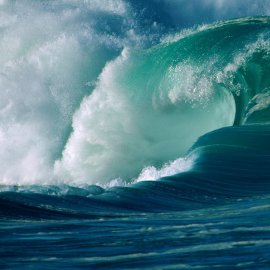State of the Ocean, 2024
-
English
-
ListenPause
[intro music]
Welcome to World Ocean Radio…
I’m Peter Neill, Director of the World Ocean Observatory.
The UNESCO Intergovernmental Oceanographic Commission is the department under which UN agencies with a maritime connection – shipping, law of the sea, food and aquaculture, ocean science and observation – promote international cooperation and coordinate programs
in research, services and capacity-building, in order to learn more about the nature and resources of the ocean and coastal areas and to apply that knowledge for the improvement of management, sustainable development, the protection of the marine environment, and the decision-making processes of its Member States. The IOC declares its major objectives as follows: healthy ocean and sustained ocean ecosystem services; effective warning systems and preparedness for tsunamis and other ocean-related hazards; resilience to climate change and contribution to its mitigation; scientifically-founded services for the sustainable ocean economy; and foresight on emerging ocean science issues. Based in Paris, it is a central umbrella department for all UN agencies with responsibility pertaining to the ocean: The International Seabed Authority, the International Maritime Organization, the Food and Agriculture Organization, The Global Observing System, the Decade for Ocean Science, UN Program for Ocean Literacy, International Seafarers’ Rights, The UN Law of the Sea, and more. Every two years it publishes a Report on the State of the Ocean; the 2024 edition was just released. I have it read through, and want to share my reactions with you.The Forward, by newly appointed IOC Executive Secretary, Vidar Helgesen, presents a summary of the Report as follows:
Considering just how much the ocean means to people and planet, the world ought to be kept up to date about its state. The fact is: we don’t know (enough).
When the first State of the Ocean Report was launched in 2022, we learnt that the quantitative description of the ocean is drastically incomplete and, as a result, current knowledge is insufficient to effectively inform solutions to the multiple ocean crises that humanity is now facing.
In this State of the Ocean Report 2024, the message remains that observations and research are falling short and hence there is a lack of adequate and aggregated data.
But as more states, industries and organizations realize that we need to measure in order to manage and protect marine ecosystems, we gradually get more data, get deeper into the issues, and can include new topics of research.
Every indication is, however, that the ocean crisis is developing faster than our knowledge of it.
We therefore need to accelerate the mobilization which is under way in the UN Decade for Ocean Science for Sustainable Development 2021-2030. We need to transform ocean science and our relationship to it. We need better knowledge as a basis for sustainable ocean planning and management, within and beyond areas of national jurisdiction. And we need a much stronger, much faster and more dynamic interplay between ocean knowledge, policy and action.
The state of the ocean is not good. Reading the individual chapters, I found various recurring themes: 1) the never-ending need for more data; 2) a general stasis in the application of knowledge to solution; 3) the negative conditions expanding at an exponential rate against conditions for positive solution, especially in the developing world, the southern hemisphere, and among indigenous populations; and 4) an affirmation of reliance on existing initiatives and institutions as the way forward regardless of the inadequacy of the results reported.
Secretary Helgesen’s final observation seems key: the need for stronger, faster, dynamic process for translating "knowledge to action.” You may notice that that intent figures large in World Ocean Radio editions, presentations focused beyond science and policy to provide examples of ideas and inventions, education and communication intended to illustrate that desired “dynamic interplay between ocean science, policy, and transformational change. How do we get catch up with the crisis? That mapping and data remain incomplete is no excuse for delaying the communication of what we already know into educational service, public engagement, and political will. For what we do know, you can consult www.worldoceanobservatory.org for additional resources, educational programs, publications, podcasts, and links to these issues, and more, as discussed in past and future editions of World Ocean Radio.
World Ocean Radio is distributed by the Public Radio Exchange and the Pacifica Network for use by college and community radio stations worldwide. Find us wherever you listen to podcasts and at world ocean observatory dot org, where the full catalog of more than 700 episodes is searchable by theme.
[outro music]
"The state of the ocean is not good." So states Vidar Helgesen in the forward to the UNESCO Intergovernmental Oceanographic Commission (IOC) State of the Ocean Report that was released in May. This week on World Ocean Radio we are summarizing the findings.
About World Ocean Radio
World Ocean Radio is a weekly series of five-minute audio essays available for syndicated use at no cost by college and community radio stations worldwide. Peter Neill, Director of the World Ocean Observatory and host of World Ocean Radio, provides coverage of a broad spectrum of ocean issues from science and education to advocacy and exemplary projects.
World Ocean Radio
14 Years, 700+ Episodes
Ocean is climate
Climate is ocean
The sea connects all things
- Login to post comments



